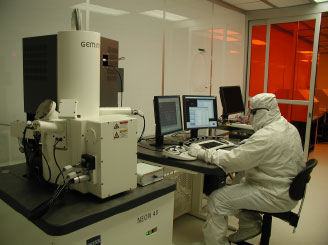Shared
Facilities:
Microelectronics
Research Center
 The
Microelectronics Research Center Facility (MRC) at The University of Texas at
Austin is a research laboratory funded by the National Science Foundation
through the National Nano-Technology Infrastructure Network (NNIN). The
Microelectronics Research Center Facility (MRC) at The University of Texas at
Austin is a research laboratory funded by the National Science Foundation
through the National Nano-Technology Infrastructure Network (NNIN).
-Process Equipment-

Group-owned
Facilities:
Ultra
High Vacuum Chemical Vapor Deposition
The cold wall, ultra
high vacuum chemical vapor deposition chamber is
used mainly for nanowire growth. The available growth and doping
precursors are SiH4, GeH4, PH3, and B2H6.
A resistive graphite substrate heater encased in pyrolytic boron-nitride
allows for growth temperatures up to 700 °C.
The tool can operate in dual mode: ultra-high vacuum, used for epi- growth,
and low pressure (up to 10 Torr), used for nanowire
growth.
 
Ultra High Vacuum High Temperature Chemical Vapor Deposition
The ultra high vacuum
(UHV) high temperature chemical vapor deposition has been
designed and built in-house. It has a cold wall chamber with a base
pressure of 1e-9 Torr, a resistive graphite
substrate heater encased in pyrolytic boron-nitride for growth temperatures
up 1000 °C. It is used for graphene-related growth,
and UHV anneals of van der Waals heterostructures.

Device Fabrication and Characterization Equipment
Low
temperature, vertical magnetic field probe station (VFTTP)
The low temperature, vertical magnetic field
probe station has a superconducting magnet, with fields of up to 2.5T, at
sample temperatures between 1.8K and 300K. Electron transport in nanowire and
2D material devices is often measured in this probe
station.

Low Temperature, horizontal magnetic
field probe station (HFTTP)
The
four probe arm, horizontal magnetic field probe
station has a split coil superconducting magnet which allows magnetic fields
of up 1T to be applied parallel to the sample. Spin injection devices are measured in this probe station.

Wire
Bonder

AFM

Oxford
Instruments Superconducting Magnet
Dewar
and superconducting magnet with fields up to 16 T.

Variable
Temperature Insert
Variable
temperature insert allows convenient loading/unloading of samples, and
operation temperatures from 1.4 K to room temperature.

Pumped
He3 Refrigerator Insert
Pumped
He3 refrigerator insert allows operation temperature down to 250 mK.

Glove box and motorized transfer
station
The
nitrogen-purged glove box allows exfoliation, storage and in-situ dry
transfer of volatile 2D materials, e.g. MoTe2, InSe,
NbSe2, etc. The motorized sample stage in the glove box is
remotely controlled by a computer and capable of accurately controlling the
temperature, movement and rotation. The stage coupled with a high-resolution
optical microscope imaging enables fabrication of exquisite 2D Van der Waals heterostructure.


|










